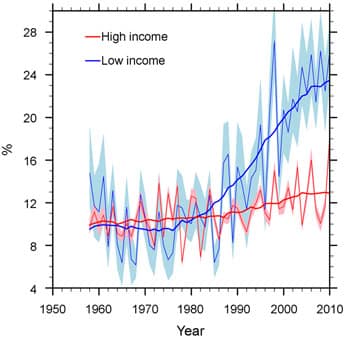New research proves that the countries least responsible for global warming, those least able to adapt, have already been hit much harder by deadly extremes than rich nations — and the gap is growing
| Hot Days Frequency Index, 1960-2010.
The percentage of extremely hot days experienced each year by low-income (blue) and high income countries (red). Thick lines represent 20 year running means. |
 |
by Ian Angus
The world’s poorest countries, those with the lowest greenhouse gas emissions, will be the most severely affected by extreme temperatures brought on by global warming.
Statements such as that appear in virtually every report and article on climate change. A feature of most such statements is use of the future tense: the poorest countries will be worse-hit than the rich ones.
But new research shows that the predicted unequal climate future has actually been with us for decades. The poorest countries have already experienced twice as great an increase in extreme temperatures as the rich ones, and the gap has been widening for more than thirty years.
A study published last week in the journal Environmental Research Letters,[1] compares the number of extremely hot days and nights in high- and low-income countries, showing how the frequency has changed since the period 1961-1990. In poor countries, there were 37 hot days a year before 1980: by 2010 that figure more than doubled, to 80 a year. In rich countries the number of hot days rose from 37 days a year to 55.[2] The figures are similar for hot nights.
As the report says, “low income countries have experienced more than twice the increase in the number of hot days occurring each year compared to high income countries.”
The researchers point out that because most poor countries are in the tropics, the human impact of hot days is more dangerous. When normal temperatures are already “close to the upper threshold for human comfort,” even a small increase in day and night temperatures “can contribute substantially to heatwave mortality.”
The authors draw three conclusions from the data.
- “Low income countries have already suffered disproportionately from global warming and have done so for decades…. Low income populations should expect more severe temperature extremes earlier than high income populations as greenhouse gas emissions continue.”
- “If the rate of change in temperature extremes remains the same in low-income countries, then within two decades the number of hot days experienced each year will very likely triple compared to the 1961–1990 average …. Such changes may be socially and economically destabilising.”
- Climate change negotiations should “take into consideration the faster growth in temperature extremes that most low-income countries have already experienced due to global warming. Our findings give weight to arguments developed by many low-income countries to justify an increase in their adaptation finance as they have already experienced disproportionately adverse impacts from global warming—and are likely to continue to do so. Our findings also lend support to calls for explicit loss and damage compensation.”
The report’s lead author says, “It’s not good for low-income or high-income countries but it’s particularly worse for the low-income countries as they are the ones which can least afford to adapt.”[3]
As I’ve written elsewhere, “a handful of Spaceship Earth’s passengers travel first-class, in plush air-conditioned cabins with every safety feature, including reserved seats in the very best lifeboats. The majority are on wooden benches in third-class, exposed to the elements, with no lifeboats at all.”[4]
Notes
[1] Nicholas Herold, Lisa Alexander, Donna Green, and Markus Donat. “Greater increases in temperature extremes in low versus high income countries.” Environmental Research Letters, Volume 12, Number 3, March 1, 2017. [2] “Hot days” are defined as those when the daily high temperature is in the top 10% for that date. “Hot nights” are defined as those when the overnight low temperature is in the top 10% for that date. [3] Nicholas Herold, quoted in “Extreme heatwave days already hitting poorer nations more than rich,” Sydney Morning Herald, March 5, 2017 [4] Ian Angus, Facing the Anthropocene: Fossil capitalism and the crisis of the earth system, Monthly Review Press, 2016, 175.

